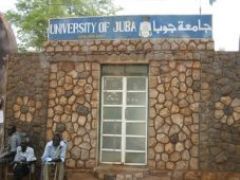S. Sudan’s first trade fair shows up investor problems
Aug 13, 2006 (JUBA) — Investors who braved a flooded camp to attend south Sudan’s first trade fair found a boom in demand after years of war, but from such a low starting point that some asked if the region was yet ripe for business.

|
|
University of Juba building where the south Sudan’s first trade fair is held this year. (USIP) . |
In a land of mud huts and swampy savannah, foreign firms are keen to quench the thirst for materials and expertise in areas from construction to farming that has been sparked by a 2005 peace deal that ended 21 years of conflict.
“This is a market we really want to penetrate because I believe it’s the last great frontier of Africa,” said George Musyoka, general manager of a Kenyan firm specialising in housing and solar panels.
“Southern Sudan is going to be a very strong force in the future, especially economically, so I want to get in before I have to compete with the big boys.”
Over the three-day fair, traders set up stalls in the window-cracked buildings of Juba University to sell generators, solar panels, paint, satellite telephones, soft drinks, books and medical supplies.
But many exhibitors venturing into south Sudan’s capital Juba for the first time experienced the autonomous region’s problems a bit too closely for comfort.
Paying thousands of dollars each in flights, accommodation and registration fees to the U.S. trade fair organiser Bread of Life Africa (BOLA), most of them arrived after hours of delay to a flooded tented camp scarce in food and toilets.
Not all enjoyed the first-hand experience of working and living in an area whose estimated eight million people have long been deprived of running water, mains electricity and tarmac roads.
HIT AND RUN?
“Is this country ready for investment? The government of southern Sudan has witnessed the debacle at the camp, but there was no attempt to intervene as a state, and yet the event is a ‘showcase’,” said visiting businessman Roy Ndisi.
“People say this is a place you hit and run, it’s not a place where you invest — that’s exactly what the government doesn’t want.”
BOLA’s executive director Donald Reid urged the traders and would-be investors to look beyond the logistical problems and seize the potential.
Former rebels who run the south under the terms of the peace deal were careful to acknowledge the worries, aware that fears about the stability of the government and its legal and financial laws deter even the boldest entrepreneurs.
“We have an investment law that we’re going to improve,” under-secretary of commerce, trade and supplies Akuei Deng Akuei told traders seated at desks in the university’s main auditorium.
But teething problems persist. The World Bank told Reuters the south’s fledgling administration had mis-procured two infrastructure contracts because of inexperience and needed more oversight.
Despite the southern government’s efforts to project a business-friendly image, many traders fretted over policies they say would make it difficult to buy land and invest in the south without a local partner.
There were more sellers than buyers wandering around the displays in a stark reminder of the deep poverty in the south, where the priority for most people is growing enough sorghum to feed their families from one season to the next.
One of Musyoka’s cement, sand and soil houses retails at $3,000, making it a distant dream for most southerners who barely scrape a living on less than a dollar a day.
“From what we are learning from the ground, the locals have no buying power so we are trying to talk to the NGOs (non-governmental organisations),” said George Ndirangu, who spent several sweaty days trying to sell metal stoves.
“Look at the event — we are trading among ourselves. I’ve not seen serious interest in what we are doing.”
(Reuters)
